At a time when thousands of migrants and refugees are trapped in a country troubled by sanctions and threats of war, Alarme Phone Sahara (APS) continues its practical solidarity.
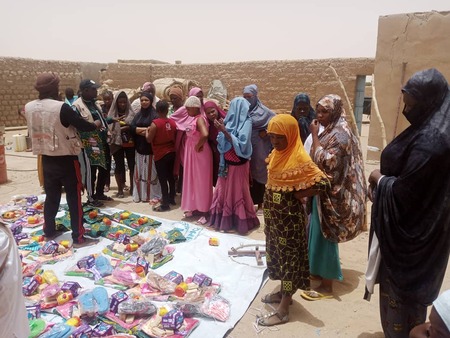
Alarme Phone Sahara distributing hygiene products to women in Assamaka
in cooperation with International Rescue Committee (IRC)
According to figures compiled by the Alarme Phone Sahara team at Assamaka (APS), on the Niger-Algeria border, at least 19,686 people of various nationalities, especially Africans, were deported from Algeria at the Niger border in conditions of systematic violence and abuse between 1 January and 16 July 2023, until the coup d'état in Niger on 26 July. These deportation figures are much higher than the comparative periods for previous years.
Even after the coup, deportations from Algeria to Niger continued, with 679 deportees arriving in Assamaka in an unofficial convoy and an official convoy on 31 July and 1 August 2023.
Dr Azizou Chéhou, APS coordinator in Agadez, visited the border village of Assamaka from 4 to 9 August 2023 as part of a joint mission with the International Rescue Committee (IRC). He reported that at that time there were still at least 3,941 deported persons in Assamaka, including 1,354 in the IOM centre, 1,333 in the sheds created with the support of the Italian NGO COOPI, 854 Malian refugees housed in the school courtyard and classrooms, and around 400 people still living on the streets.
The mission organised by IRC with the participation of APS took with it materials to support the migrants deported to Assamaka, in particular materials to rehabilitate the sheds created by COOPI, as well as hygiene kits for women and children.
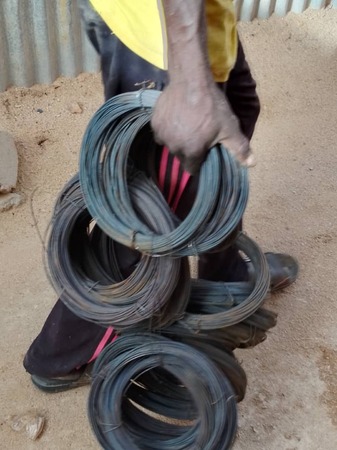
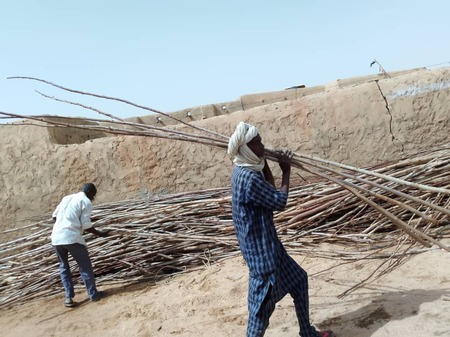
Alarme Phone Sahara rehabilitating sheds in Assamaka
in cooperation with International Rescue Committee (IRC)
Finally, in order to provide pragmatic solutions to the most urgent needs of deported migrants, additional sheds have been built with equipment provided by IRC and APS in the IOM camp and in the police station compound, where people must otherwise wait to be registered under the scorching sun after arriving in Assamaka.
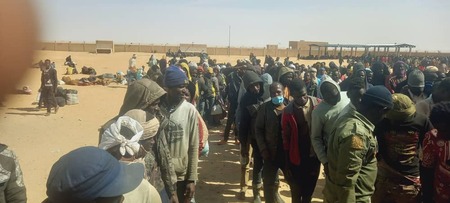
People waiting for registration after deportation from Algeria
under the scorching sun at Assamaka police station
Deportees in Assamaka: precarious living conditions and evacuations pending due to ECOWAS sanctions
According to Dr Chéhou, coordinator of Alarme Phone Sahara, the situation of the deportees in Assamaka is somewhat better than at the worst humanitarian crisis in February and March 2023, thanks to the humanitarian support mobilised by urgent appeals of APS and Médecins Sans Frontières (MSF), among others. There is a basic supply of food and emergency shelters have been set up by the Italian NGO "COOPI" in addition to the IOM reception camp. Considerable funds have been made available for this humanitarian aid by ECHO, the EU's Civil Protection and European Humanitarian Aid department.
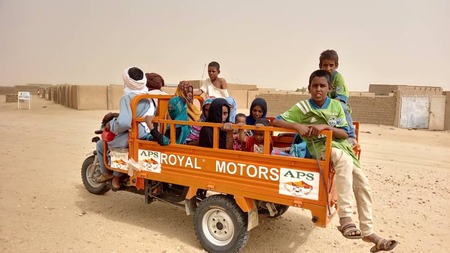
Tricycle of Alarme Phone Sahara assisting a group nof refugees from Mali in Assamaka
However, the situation remains extremely precarious and is likely to get even worse: on the one hand, the question arises as to the extent to which the massive sanctions imposed on Niger by the ECOWAS states and supported by the EU will have an impact on EU funding for humanitarian aid activities in Assamaka. Another serious problem is the unresolved issue of the evacuation of people stranded in Assamaka following their deportation. Even before the coup d'état in Niger, IOM evacuation transports were still operating very slowly, and according to research by the coordinator of Alarme Phone Sahara, even these transports have been suspended since the putsch.
The IOM points out that, following reactions to the coup d'état, several of Niger's borders with neighbouring countries are closed. In addition, the current closure of Niger's airspace, decreed to protect against the threat of military intervention by ECOWAS, means that it is currently impossible to evacuate by air people who decide to return to their country of origin.
This creates an extremely distressing situation for those who have been stranded for longer in this village in the middle of the desert. Uncertainty about how the situation in the country will evolve after the coup, in the face of sanctions and threats of war, is a further source of fear and insecurity for migrants in Assamaka and elsewhere in Niger.
With evacuation transports cancelled, those who are able to do so are now trying to organise their departure from Assamaka in other ways, by calling family members to send them money. According to officials at the Assamaka bus station, vehicles capable of carrying 25 people each regularly leave Assamaka for Arlit at a cost of 10,000 Francs CFA per person. For many, this is certainly not possible if, during their deportation, they have had their money and personal belongings stolen by the Algerian security forces and if, at the same time, they have no one to help them with money.
Among the deportees, there are even people who, despite everything they have already suffered, try again to return to Algeria as soon as they are dropped off at Point Zero in the border zone.
In their desperate situation, people from different countries of origin gathered on 7 August to protest and demand the rapid evacuation of Assamaka. According to the APS coordinator's observations, they clashed with the local police force, police officers fired in the air, and one man from Mali was wounded in the finger and subsequently had to be treated in the local infirmary.
According to the observations of the Alarme Phone Sahara team in Assamaka, 500 migrants have finally been evacuated from Assamaka to Arlit by the IOM on 30th of August 2023. It is also urgent to find a rapid solution for all the others who are still stranded in Assamaka.
In an interview with the coordinator of Alarme Phone Sahara, a man from Guinea-Bissau described the situation of the deportees stranded at Assamaka as follows:
Bissau-Guinean migrant: "(...) We're tired here in Assamaka, we're very tired here. (...) There's food, but every day it's the same (...). Every day is the same until now. Where to sleep every day, it's dust. You don't sleep well. The showers are no good. The toilets are no good. From morning until tomorrow morning, there's no water. Have you seen the clothes here? I had to put up with them for a month. Since then, in prison, in Algeria, until now, that's all I've got. (...) I need the people there to make an effort to get us out of here. Everyone has to go home. We're very tired here. Every day sick, sick, sick. There's no medicine in the hospital. (...) I've been here since 24 June.
Dr. Azizou Chéhou: This morning, around 12:30, we heard gunfire in the air. What really happened?
Guinea-Bissau migrant: It's us with the IOM people. Because of the convoys leaving for Arlit (...) Arlit, then Agadez. In Agadez, there are people leaving for Niamey, to return to your country. People tell us that there are no convoys now. We have to wait. But they've really worn us out here. That's why we're having this discussion. They've said to see if there's any option to leave these days. But right now it's not good, because there are problems here. There's a coup d'état here. It's not safe, nothing is safe. We want to leave because we're worried.
Dr. Azizou Chéhou: What were the conclusions of the meeting between the migrants and the police?
Guinea-Bissau migrant: That policeman came to keep an eye on the people, to calm them down, so that they wouldn't do anything.
Dr. Azizou Chéhou: And is it true that a policeman was injured?
Guinea-Bissau migrant: No, it was a Malian who was injured, not a policeman. Even if a policeman got injured, I don't know, because there were a lot of people there (...) It's here that he's injured, it's his finger. But it's not that serious.
Dr. Azizou Chéhou: And he's already been treated. Did you go with him to hospital?
Guinea-Bissau migrant: Yes.
Dr. Azizou Chéhou: And all the communities from all the countries were there?
Guinea-Bissau migrant: Yes, many countries. (...) There was Guinea Bissau, Burkina Faso, Ghana, everything. The whole world. Nigeria, Mali, Senegal, Gambians, Guinea Conakry, everyone wanted to go back. All the people.
Dr. Azizou Chéhou: And it's true that they stayed here for a long time?
Guinea-Bissau migrant: Some people have been here for three or two months. So far, they haven't left for Arlit. If you go to Arlit, you're going to stay there again for a long time. Agadez, you're still going to last there. When are we going to be away from here?
Dr. Azizou Chéhou: And is it true what they told us, that there are some migrants who pay the transport to leave?
Guinea-Bissau migrant: A lot of them leave because they're not prepared to wait for these people here. There's no food here, not even sardines. You've seen what they give you to eat, it's not good (...) Every day it's the same thing, the same rice, the same dish. We don't sleep well, we don't eat well, it's all bad here.
Dr. Azizou Chéhou: About how many people are here?
Guinea-Bissau migrant: You've looked around, you've seen, there are about a hundred or so of us, or fifty or so, it depends, in this hangar. It's Senegalese, Malians, Gambians, by country.
Dr. Azizou Chéhou: Are you hopeful that things will return to normal?
Bissau-Guinean migrant: Yes, things have returned to normal a bit, we'll wait a few days, three days, four days, if we don't get anything, we'll continue the strike. If we don't get anything, we'll continue the strike. If there's no chance, each person will manage, each person will leave, try to manage, call his family to do something for him to leave (...) Even in the Algerian prison, it's better than here. We're really tired here. You see, from morning, you're going to stay in the sun until nightfall. Even I feel something when I talk (...). You have to stay for 5 minutes, 10 minutes, to recover and see.
Dr. Azizou Chéhou: Have you been consulted by the doctors?
Guinea-Bissau migrant: I went there, but there's no medicine. (...) There are a lot of people in the camp to get this out, you see (...) They can't walk, they're sick. (...) Some people have tuberculosis, such kind of sickness".
An uncertain future for migrants and refugees in Niger
On the whole, the social and economic situation is difficult for the people of Niger in the face of severe sanctions that affect the population first and foremost. The members of Alarme Phone Sahara in Niger are witnessing on a daily basis the consequences that are threatening people's existence, including a massive rise in the price of basic foodstuffs and basic necessities. The scarcity and rising prices are further exacerbated by the fact that many people are making reserve purchases due to fears of an imminent attack on the country.
The most vulnerable and precarious sections of the population, who have neither reserves nor means of subsistence production, including the many migrants and refugees who find themselves stranded in Niger empty-handed, are the hardest hit.
The IOM, which manages 7 transit centres in Niger, including 4 in Agadez and 3 in Niamey, as well as other reception camps in Assamaka and Arlit and other areas of Niger, has stated that more and more migrants are being stranded in Niger as a result of the ECOWAS sanctions against Niger. There are currently 5,000 people in IOM transit centres, which in fact only house people who agree to a so-called "voluntary" return to their country.
In addition, there are 1,800 people waiting at the gates of its transit centres, but who have not yet found access, arguing that the transit centres are already overflowing and that the IOM itself lacks the resources. Faced with this situation, the IOM is calling for a humanitarian corridor for migrants trapped in Niger, to enable them to return to their countries of origin.
On the one hand, it should be noted that of Niger's borders with its neighbours, only the Niger-Nigeria and Niger-Benin borders have so far been officially closed due to ECOWAS sanctions, but not the borders with Mali, Burkina Faso, Chad, Libya and Algeria, as these countries do not support ECOWAS actions and some are not even members of ECOWAS. At the same time, the closure of Niger's airspace is currently preventing IOM, which is not itself involved in the ECOWAS sanctions against Niger, from airlifting people to their countries of origin, as it has done on several previous occasions.
In any case, it is undeniable that thousands of migrants and refugees are stranded in Niger in extremely precarious, uncertain and even dangerous conditions due to the threat of war. This situation is also the consequence of the fact that the EU states have supported and paid the Nigerien state for years to prevent the movement of people on flight and migration routes. It is therefore also the responsibility of these states to contribute now to urgent and necessary solutions that offer prospects to all these people.
Overall, the state of threat and siege imposed by ECOWAS on the State of Niger, which is reacting by strengthening the protection of its borders, continues to undermine the principle of freedom of travel and movement, once enshrined in the ECOWAS protocol. In this sense, it is a major challenge to find solutions that simultaneously guarantee peace, freedom of movement and better living conditions in the Sahelian countries and throughout West Africa and beyond.
Alarme Phone Sahara demands
- An immediate halt to all deportations from Algeria and other countries to Niger!
- Humanitarian aid, accommodation and care for migrants and refugees in Niger must be guaranteed and must under no circumstances be suspended or reduced because of sanctions against Niger!
- Alarme Phone Sahara is in favour of the IOM initiative for a humanitarian corridor for the return to their countries of origin of those migrants for whom this is a real prospect. At the same time, bearing in mind that there are also all those who no longer want to or cannot return to their countries of origin, Alarme Phone Sahara is also calling for evacuation and resettlement programmes for those stranded in Niger in other countries!
- A solution of peace for Niger and its neighbouring countries, which would also restore freedom of movement in the Sahel-Saharan region and create secure travel and flight routes!
- No to sanctions and threats of war against Niger! Instead, there must be solutions that guarantee the right of the people of Niger to manage their own socio-political future!
Numbers of people deported 11 April - 1 August 2023
11 April 2023: 487 deportees in an unofficial deportation convoy arrived in Assamaka on foot at around 11pm, including 7 women, 2 underage girls, 4 underage boys and 474 men.
The largest groups of deportees were 249 Guineans and 121 Malians.
Among them were 33 nationals of Côte d'Ivoire, 3 from Burkina Faso, 2 from Cameroon, 21 from Senegal, 20 from Gambia, 14 from Sierra Leone, 3 from Guinea Bissau, 5 from Niger, one person from Liberia, one from Togo and one from the Central African Republic.
13 April 2023: Arrival of an official deportation convoy with 327 people, including 14 women, 11 underage girls, 4 underage boys and 298 men. The deportees included 315 Niger citizens and 12 nationals of other countries: 2 from Benin, 5 from Nigeria, 3 from Sudan and 2 from Togo.
22 April 2023: 709 deportees in an unofficial deportation convoy arrive in Assamaka on foot, including 4 women, 4 under-age girls, 2 under-age boys and 700 men.
The largest groups of deportees were 298 Guineans and 138 Malians.
Among them were 56 nationals of Côte d'Ivoire, 21 from Benin, 7 from Burkina Faso, 18 from Cameroon, 38 from Senegal, 31 from Gambia, 22 from Sierra Leone, 2 from Guinea Bissau, 64 from Niger, 3 from Liberia, 8 from Nigeria, one person from Togo, one from Ghana and one from Congo.
24 April 2023: Arrival of an official deportation convoy with 438 people, including 33 women, 26 under-age girls, 13 under-age boys and 366 men. The deportees included 436 citizens of Niger and 2 from Nigeria.
20 May 2023: 123 people deported in an unofficial deportation convoy arrived in Assamaka on foot, including 20 under-age boys and 103 men.
The largest groups of deportees were 21 Guineans, 23 Malians and 23 Nigerians.
Among them were 16 from Côte d'Ivoire, 9 from Cameroon, 4 from Senegal, 6 from Gambia, 7 from Chad, one from Sudan, one from Benin and one from Burkina Faso.
In addition, the Alarme Phone Sahara coordination reports that these deportees had been dumped at Point Zéro on the Niger-Algeria border by 7 trucks, but that some had converged on a gold-mining site on the Algerian-Malian border by hitchhiking with trucks.
21 May 2023: 449 deportees in an unofficial deportation convoy arrived in Assamaka on foot around 6am, including 2 women, a minor girl, 22 minor boys and 424 men.
The largest groups of deportees were 230 Guineans and 76 Malians.
Among them were 54 nationals from Côte d'Ivoire, 4 from Burkina Faso, 2 from Cameroon, 16 from Senegal, 25 from Gambia, 17 from Sierra Leone, 20 from Niger, 2 from Nigeria, 2 from the Central African Republic and one person from Liberia.
22 May 2023: Arrival of an official deportation convoy carrying 794 people, including 5 women, 68 minors and 721 men. The deportees included 692 Niger citizens and 102 nationals of other countries: 43 from Mali, 26 from Guinea, 12 from Gambia, 7 from Sudan, 3 from Nigeria, 2 from Senegal, 2 from Sierra Leone and one from Côte d'Ivoire. In addition, 6 Syrians were immediately pushed back to Algeria.
It should be noted that before their arrival, a convoy of 1,675 deportees had been announced, and that it is not yet clear what has become of the 881 people who didn’t arrive in Niger any more.
23. May 2023: 672 deportees in an unofficial deportation convoy arrived in Assamaka on foot around 9am, including 25 women, one minor girl, 5 minor boys and 641 men.
The largest groups of deportees were 216 Guineans and 142 Malians.
Among them were 38 nationals of Côte d'Ivoire, 79 from Burkina Faso, 43 from Senegal, 60 from Gambia, 21 from Cameroon, 4 from Sierra Leone, 5 from Niger, 20 from Nigeria, 17 from Benin, 5 from Sudan, 4 from Liberia, 3 from Congo, 3 from Ghana, 2 from Guinea Bissau, 2 from Chad, one person from Gabon and one from Equatorial Guinea. In addition, 2 Afghans, 2 Yemenis, one Pakistani and one Syrian were turned back directly to Algeria.
25 May 2023: Arrival of an official deportation convoy carrying 493 people, including 114 women, 138 minors and 241 men.
The deportees included 451 citizens of Niger and 42 nationals of other countries:
3 from Mali, 7 from Guinea, 4 from Sudan, 18 from Nigeria, 4 from Sierra Leone, 2 from Chad, one from Burkina Faso, one from Cameroon, one from Eritrea and one from Liberia.
It should be noted that before their arrival, a convoy of 649 deportees had been announced, and that it is not clear at the moment what has become of the 156 people who no longer arrived in Niger.
02 June 2023: Arrival of an official deportation convoy with 654 people, including 10 women, 62 minor boys and 582 men.
The deportees included 565 Niger citizens and 89 nationals of other countries: 3 from Mali, 24 from Guinea, 4 from Sudan, 3 from Nigeria, 37 from Burkina Faso, 6 from Cameroon, 3 from Liberia, 6 from Côte d'Ivoire and 3 from Gambia.
19.06.2023: 476 Malians who were deported and dumped in the border area arrived in Assamaka, including 64 men, 143 women, 112 underage girls and 157 underage boys.
It was also reported that on the same day and the following day, 500 people from a Tuareg community in In Guezzam, Algeria, arrived at the Assamaka police station after being deported by the Algerian authorities with their belongings. According to the report, these Tuaregs were deported even though they themselves claim to be Algerian citizens. A case that shows that the xenophobic policy of the Algerian state ultimately threatens not only the migrant population, but also its own citizens.
24.06.2023: 739 deportees in an unofficial deportation convoy arrived in Assamaka on foot at around 05:30 in the morning, including 18 women, 16 under-age girls, 67 under-age boys and 638 men.
The largest groups of deportees were 276 Guineans and 202 Malians.
Among them were 60 nationals from Côte d'Ivoire, 21 from Burkina Faso, 52 from Senegal, 58 from Gambia, 6 from Cameroon, 15 from Sierra Leone, 2 from Niger, 12 from Nigeria, 22 from Benin, 4 from Sudan, 2 from Ghana, 6 from Chad and one person from Guinea Bissau.
25.06.2023: Arrival of an official deportation convoy with 654 people, including 34 women, 20 minors and 600 men, deported in 19 lorries at around 10:00 am.
The deportees included 648 Niger citizens and 6 nationals of other countries: 3 from Guinea, one from Nigeria, one from Mali and one from Gambia.
15.07.2023: 919 deportees in an unofficial deportation convoy arrived in Assamaka at around 07:15 in the morning, including 22 women, one minor girl, 3 minor boys and 893 men.
The largest groups of deportees were 242 Guineans, 227 Malians and 200 Gambians.
Among them were 56 nationals from Côte d'Ivoire, 21 from Burkina Faso, 58 from Senegal, 23 from Cameroon, 25 from Sierra Leone, 17 from Nigeria, 31 from Benin, 2 from Ghana, 4 from Guinea Bissau, 2 from Liberia and 3 from Togo. In addition, 08 Syrians were immediately deported to Algeria.
16.07.2023: Arrival of an official deportation convoy with 416 deportees, including 16 women, 8 under-age girls, 5 under-age boys and 387 men, at around 1:10pm.
The deportees included 412 Niger citizens and 4 nationals of other countries: 2 from Benin, one from Mali and one from Gambia.
31.07.2023: 338 deportees in an unofficial deportation convoy arrive in Assamaka at around 02:30 in the morning, including 10 women, 7 under-age girls, 11 under-age boys and 310 men.
The largest groups of deportees were 89 Guineans and 119 Malians.
Among them were also 28 nationals from Côte d'Ivoire, 3 from Burkina Faso, 18 from Senegal, 15 from Cameroon, 6 from Sierra Leone, 23 from Nigeria, 5 from Liberia, 2 from Togo, 20 from Gambia, 4 from Sudan, 4 from Somalia, one person from Ghana and one from the Central African Republic.
01.08.2023: Arrival of an official deportation convoy with 341 deportees, including 9 women, 4 under-age girls, 3 under-age boys and 325 men.
The deportees included 279 Niger citizens and 62 nationals of other countries: 3 Ivorians, 2 Ghanaians, 3 Guineans, 13 Malians, 2 Nigerians, 2 Sierra Leoneans, 10 Sudanese, 26 Chadians and one Burkinabè.

